Earlier this May SEPTA held public comment about their proposed FY2024 capital and operations budgets. These budgets are a big deal because they direct the future of public transportation in the Philadelphia area, which is an important form of sustainable transportation, as well as a vital resource for many in the region. These budgets propose lots of important investments including funding for improving the accessibility of the transit system, and instituting a second free transfer for riders when they pay with SEPTA Key. You can view the budgets here, and read a summary of what is included from our partners at Transit Forward Philly here.
Maya Frydman, a Transportation Outreach Coordinator at the Council, attended the hearings and gave public comment on behalf of the Council. You can read their comments below. SEPTA is still accepting public comment until May 31st, if you would like to share your thoughts on what to prioritize when it comes to transportation spending you can email operatingbudget@septa.org and capbudget@septa.org respectively. You can also leave a comment in the form of a voicemail by calling 215-580-7772 for the operations budget and 215-580-7771 for the capital budget. Making public transit accessible, reliable, affordable, and frequent is one of the best ways to combat fossil fuel emissions and support the health of the region, so share your thoughts with SEPTA and stay engaged with our transportation work going forward.
Operational Budget Testimony:
Capital Budget Testimony:
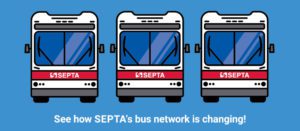
SEPTA recently released their draft bus network redesign, which overhauls the entire bus system with the aim of making bus lines more convenient, reliable, and easier to understand for riders. This redesign includes big changes to the network as well as individual bus lines.
From now through December, SEPTA is hosting a series of in-person and virtual community meetings to hear what bus riders think about these changes. If you are a SEPTA bus rider, make sure to take a look at the network redesign and show up to your local meeting to give your feedback to SEPTA.
Here are the upcoming in-person community meetings:
- 11/3 Thu, 4–6 pm: Chester City Hall Community Room, 1 E 4th St, Chester, PA 19013
- 11/5 Sat, 1–3:30 pm: East Passyunk Community Center, 1025 Mifflin St, Philadelphia, PA 19148
- 11/9 Wed, 3–5 pm: Lucien Blackwell Community Center, 761 N 47th St, Philadelphia, PA, 19139
- 11/10 Thu, 5–7:30 pm: Kingsessing Recreation Center, 4901 Kingsessing Ave, Philadelphia, PA 19143
- 11/12 Sat, 2:30–4:30 pm: Upper Darby Free Library Municipal Branch, 501 Bywood Ave, Upper Darby, PA 19082
- 11/15 Tue, 5:30 – 7:30 pm: Lower Merion Administration Building, 75 E Lancaster Ave, Ardmore, PA 19003
- 11/16 Wed, 6–8 pm: The Liacouras Center, Fox-Gittis Room, 1776 N Broad St, Philadelphia, PA 19121
- 12/8 Thu, 5:30–7:30 pm: SEPTA, 1234 Market St, 3rd Floor, Philadelphia, PA 19107
In addition to these in person meetings, SEPTA is also hosting virtual conversations on Monday nights where community members can share their thoughts about the draft network. These, like the in-person meetings, will each focus on a specific neighborhood.
Here is the schedule for virtual community meetings:
- 11/7 Mon, 6:30-7:30 pm: Northwest Philly – Register
- 11/14 Mon, 6:30-7:30 pm: South Philly – Register
- 11/21 Mon, 6:30-7:30 pm: Bucks & Montgomery Counties – Register
- 11/28 Mon, 6:30-7:30 pm: West Philly – Register
- 12/5 Mon, 6:30-7:30 pm: North Philly – Register
- 12/12 Mon, 6:30-7:30 pm: Center City – Register
Attendees at both the in-person and virtual meetings will be entered into a prize raffle, but more importantly this is an opportunity for bus riders to let SEPTA know their thoughts before these changes are finalized.
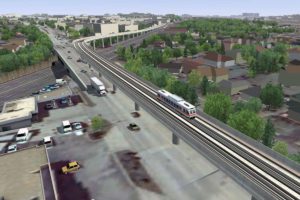
The King of Prussia Mall is the largest suburban mall in the Philadelphia region with 400 stores, and a total of 31,500 people employed at the mall and nearby office parks. The mall is visited by about 68,000 people daily with 5,600 bus riders using six routes to and from the KOP area. Unfortunately, there is currently no rapid transit to get commuters and shoppers to the mall. That is why SEPTA and the King of Prussia business community are planning to extend the Norristown High Speed Line, which skirts the edge of the KOP currently, the rest of the way to King of Prussia.
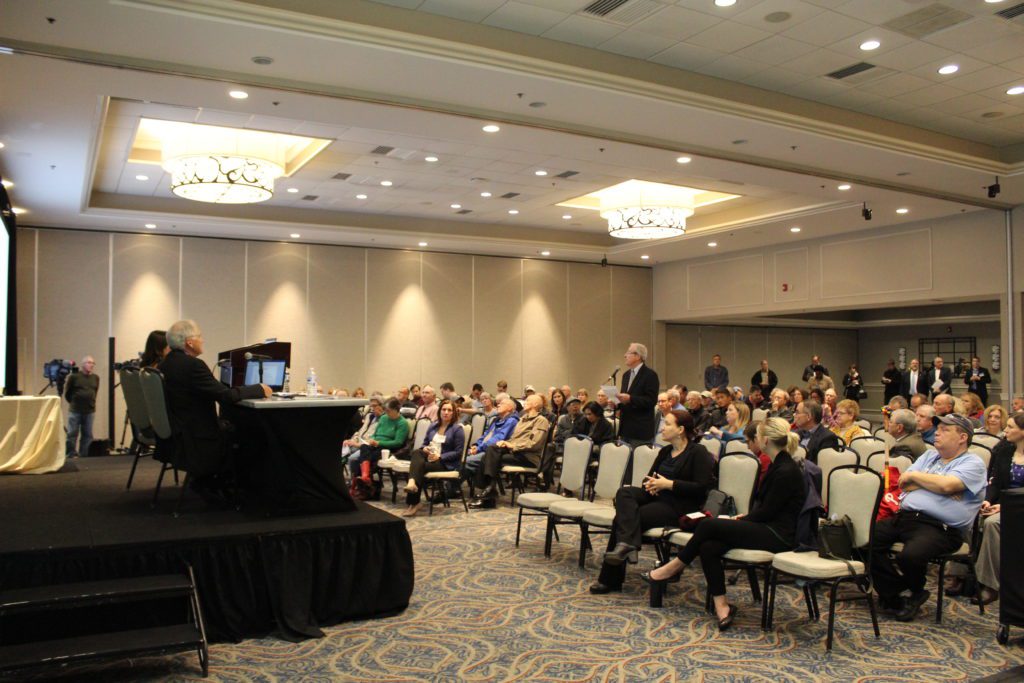
Currently, it can take commuters from Philadelphia as much as two hours to get to work in King of Prussia on the bus, and drivers take an average of 70 minutes – both while navigating the unpredictable beast known as the Schuylkill Expressway. A light rail connection would ease the burden on our transit system and reduce traffic on the already congested expressways near the mall.According to the proposal, the new rail line would take around 40 minutes for the same trip, and offer an appealing option for people who have the choice between driving or public transit.
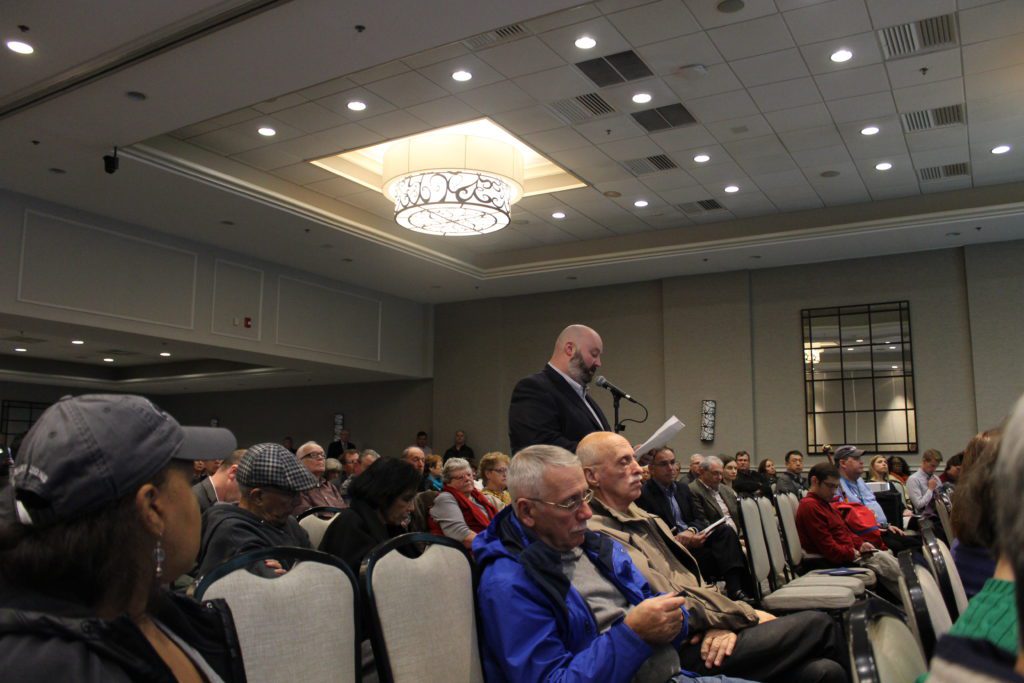
Clean Air Council was there to express its support for the project. Not only does the Council believe it will ease the commutes of transit riders and mall employees, this project will have a ripple effect on the region’s traffic problem. The more reliable transit lines the Delaware Valley has, the more likely commuters will choose to leave the car behind. This will ultimately reduce emissions, and let us all breathe a little easier.
The Council wrote a letter voicing its support, and sent Kamali Alloway, Sustainable Transportation and Special Events Outreach Coordinator, to read the letter aloud at the public hearing. You can read the letter here, and watch a video of Alloway reading the letter below. This project is still in the first stage, and its projected completion date is a few years away. Clean Air Council will keep you updated on developments as they occur.
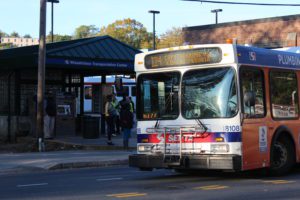
The point where the Wissahickon Creek meets the Schuylkill River has been an important link to travel in the area for thousands of years. Today, it’s highly congested with transit and vehicle traffic entering and exiting the Roosevelt and Schuylkill Expressways.
It’s a hub for SEPTA with 11 bus routes stopping at the Wissahickon Transportation Center, and the Wissahickon Regional Rail Station just a few hundred feet away, Two of the region’s most popular trails, the Schuylkill and Wissahickon, converge here as well. “We have all these modes of transportation butting heads here,” said Matt Wysong, Senior Planner at the Philadelphia Planning Commission. “That was an obvious issue we identified in this plan.”
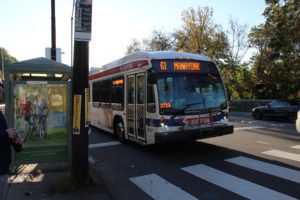
Thousands of commuters pass through the Wissahickon Transportation Center (WTC) and along Ridge Avenue every day heading into Center City, and also west to the suburbs. The city’s Planning Commission has identified this part of the city as a focus area for improving service and accessibility to riders, and recently conducted a boots on the ground survey to find out what people think about their commute through this area.
“We are here today to talk to the people that use the area,” Wysong said. “To get a better understanding of what they see as the conditions on the ground, the issues and the greater opportunities.”
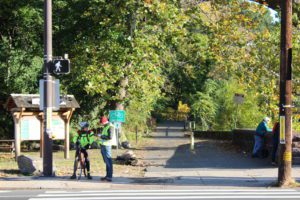
Wysong and a small group of surveyors from Clean Air Council and the city’s Planning Commission were out during peak hours, speaking to people getting off buses and riding bikes along the Wissahickon trail. Wysong told us that many people riding SEPTA often took more than one bus to get to their destination, and some even had commutes that were two hours long.
Wysong says he noticed the area is particularly hard for cyclists to navigate. “What I am observing here is that there is a lot of conflicts for bicyclists,” Wysong said. “They’re just trying to use every inch of space to kind of get through it somehow.” He pointed out that with no clear path through the area, cyclists run the risk of colliding with cars and pedestrians.
SEPTA recently received federal funding to update WTC, and Wysong tells us that SEPTA is looking to expand to the lot next door. He says this would allow for double the capacity of the current WTC. He also tells us that once SEPTA completes this project, Parks and Recreation wants to connect the Schuylkill River trail along the water.
Currently, trail users are forced to travel through this congested area before getting back on the Schuylkill River Trail. Once finished, the trail will eventually connect to the Pencoyd bridge over the Schuylkill River and allow riders to enjoy trails on either side of the river. This is one of the last remaining undeveloped segments of the Schuylkill River Trail, and once it’s linked up here, riders will be able to enjoy a safe ride all the way up to Pottsville.
For more info on the project and public hearings regarding the study click here.

GoPhillyGo.org, the free online mapping site for the greater Philadelphia area from Clean Air Council, has now released a mobile version for use on all mobile devices. Designed to make getting around without a car both easy and fun, the power of GoPhillyGo’s mapping technology will now be available on the go. You’ll be able to take the ultimate trip-planning tool for biking, walking and public transit with you—anywhere you go, any time you need it.
Developed with state-of-the-art open-source mapping technology from Philadelphia-based geospatial technology firm Azavea, GoPhillyGo makes it easy to plan a route through multimodal methods — combining biking, walking, and public transportation within one trip — to go anywhere within the greater Philadelphia area, its surrounding counties, and even into New Jersey without the use of a car. It provides details on pedestrian and bike routes and, on the bike segment of your trip, you can prioritize routes that are faster, flatter, or safer.
“Using GoPhillyGo on your mobile phone is a very exciting advancement for the website,” says Joe Minott, Executive Director of the Clean Air Council. “Obviously that is how so many people are accessing transportation information today, and I’m excited that planning non-car trips just became easier for people in Southeastern Pennsylvania. GoPhillyGo users can now explore some of the region’s most interesting nature-oriented destinations and quickly plan how they’ll get there on bike, foot, public transportation, or any combination.”
The new version of the website comes equipped with mobile functionality, a new look and sleek features, including drag-and-drop locations. Different modes of transport in your route now show up in different colors.
“Incorporating Indego bike share is the other big advancement we are excited about,” explains Nick Rogers, Transportation Program Director for the Clean Air Council. “This really makes planning trips with bike share much easier, and encourages people to use Indego as a transportation mode and not just a recreation activity.” Point-to-point Indego directions, dock locations, and bike availability are now included in the map, helping you get around by bike, even if you don’t own one.
“As a Philadelphia company dedicated to a positive civic and social impact, Azavea is thrilled to partner with the Clean Air Council to promote walking, biking, and riding public transit to our local institutions, parks, and other natural resources,” says Robert Cheetham of Azavea. “Now that GoPhillyGo has gone mobile, anyone in Philadelphia can easily explore the variety of destinations accessible to them. As a company full of bike enthusiasts, we are especially excited about the inclusion of Indego bike share locations into GoPhillyGo biking directions.”
Now, with GoPhillyGo mobile, you can get out of your house and just go. Covering five counties—including Philadelphia—and parts of New Jersey, the new mobile site allows you to plan ahead and take your route with you, change your plans on the fly, or figure it out as you go for a truly spontaneous adventure. Confidently explore Philadelphia; no car needed.
GoPhillyGo.org. Your destination ahead. Your map to getting there.
Clean Air Council is a member-supported, nonprofit environmental organization dedicated to protecting everyone’s right to breathe clean air. The Council has over 8,000 members and works in Pennsylvania, Delaware, and New Jersey on public education, community advocacy, and legal oversight and enforcement of environmental laws.
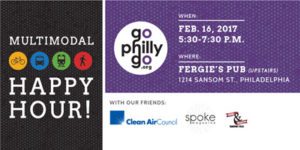
You’re invited to join GoPhillyGo, SPOKE magazine, and Firth & Wilson Transport Cycles on Thursday, February 16 for a multimodal happy hour upstairs at Fergie’s Pub (1214 Sansom St). Philadelphia is fast becoming one of the leading cities in the U.S. to get around without a car, and it just keeps getting better. You’ll hear about an exciting new aspect of GoPhillyGo.org that’s being launched soon, news and plans for the coming year, and you’ll meet up with friends and other multimodal transportation advocates.
RSVP on Eventbrite and join the Multimodal Happy Hour Facebook event page to stay up to date.
We hope to see you there!
What:
Multimodal Transportation Happy Hour hosted by GoPhillyGo, SPOKE magazine, and Firth & Wilson Transport Cycles
When:
Thursday, February 16, 5:30 pm – 7:30 pm
Where:
2nd Floor
1214 Sansom St., Philadelphia, PA 19107
Plan your multimodal trip with GoPhillyGo.org!
Cost:
Admission is free, finger food is free, and drinks are pay as you go. First 50 people in the door will receive a free drink ticket.
About the Organizations
GoPhillyGo is a free online mapping tool for the Greater Philadelphia area, with a major upgrade coming in 2017. Developed with state-of-the-art mapping technology, this site makes it easy for users to plan their routes through multimodal methods — combining biking + walking + public transportation within one trip — to go anywhere within the Greater Philadelphia area without the use of a car. It even provides details on pedestrian and bike routes, letting users customize their trips. Go to www.gophillygo.org to plan your trip today and connect with GoPhillyGo on Facebook or on Twitter and Instagram at @go_philly_go.
SPOKE magazine informs and engages greater Philadelphia by covering mobility. With a focus on long-form journalism and storytelling, the magazine examines urban life through the lenses of bicycling, walking and mass transit. Go to www.spokemag.bike to read SPOKE magazine today and connect with SPOKE magazine on Facebook or on Twitter and Instagram at @spoke_mag.
Firth & Wilson Transport Cycles is a full-service bicycle shop and retail showroom specializing in transportation and cargo bicycles. Now located at 1105 Frankford Avenue, the shop caters exclusively to the urban cyclist with a full range of bike accessories and bicycles from Yuba, Xtracycle, Babboe, Gazelle, Larry Vs Harry, Pashley, Simcoe, Breezer, Linus, Pure Fix, Pure City, SE, and Torker. The option of a custom fabricated bicycle is also on offer, designed by the shop’s owners under the labels David Wilson Industries (DWI) custom cargo bikes and Hanford Cycles custom frames. Go to www.transportcycle.com for more information, and connect with them on Facebook or on Twitter and Instagram at @transportcycles.
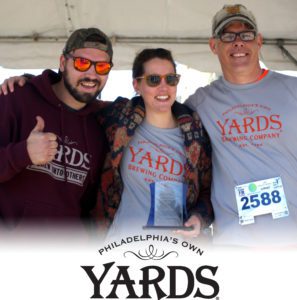
It’s nomination time for the Clean Air Commute Awards! Each year at the Run for Clean Air, Clean Air Council awards the Clean Air Commute Employer and Clean Air Commuter award to the employer and commuter who are the most committed to sustainable commutes. Our previous winners show different ways of being an exemplary employer—see how your company compares!
Our easy entry form for the Clean Air Commute Employer Award is here, and the Clean Air Commuter form is here. Nominations close March 10, 2017.
Public Transportation Benefits
Public transportation is often a much cheaper commute than driving, but that doesn’t make it a welcome expense. With RideEco, WageWorks, and similar public transportation benefits, employers and commuters save money. Commuters pay for their public transportation with pre-tax earnings, and employers get lower payroll taxes. Some options for the programs allow commuters to receive passes at their workplace, saving time. 2016 Clean Air Commute Employer Yards Brewing Company offers employees a pre-tax benefit, and so does 2016 runner-up Elsevier.
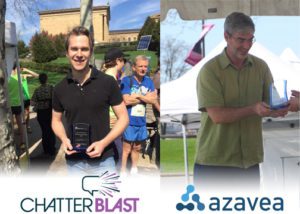
At Clean Air Council, we often talk to commuters who say they’d gladly take public transportation to work if their workplace were more accessible. All three of the Clean Air Commute Employers and runner-up Elsevier purposely chose public transportation accessible locations. 2015 co-winners Azavea and ChatterBlast, as well as Elsevier are all located in or near Center City Philadelphia, and Yards Brewing Company is close to the subway and multiple bus lines.
Bike Parking
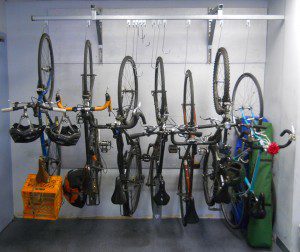 Providing a dry, secure, easy place to store commuters’ bikes takes half the hassle out of bike commuting. It’s so helpful and easy to offer that it’s no surprise that all of our Clean Air Commute Employers have indoor bike storage. Secure bike parking can range from an office rack to a secure, separate room. (At Clean Air Council, it’s a metal hanging rack in the conference room, and it’s full except on the wettest and coldest days.) ChatterBlast and Azavea both have bike racks inside their offices. Yards Brewing Company has bike racks both inside and outside of its brewery in Northern Liberties, and Elsevier shares a locked bike room with its building’s other tenants. No matter the rack style, employees have the peace of mind that their bike is sheltered from the elements and theft. As a bonus, having more bikes in the office can foster a culture of biking as transportation.
Providing a dry, secure, easy place to store commuters’ bikes takes half the hassle out of bike commuting. It’s so helpful and easy to offer that it’s no surprise that all of our Clean Air Commute Employers have indoor bike storage. Secure bike parking can range from an office rack to a secure, separate room. (At Clean Air Council, it’s a metal hanging rack in the conference room, and it’s full except on the wettest and coldest days.) ChatterBlast and Azavea both have bike racks inside their offices. Yards Brewing Company has bike racks both inside and outside of its brewery in Northern Liberties, and Elsevier shares a locked bike room with its building’s other tenants. No matter the rack style, employees have the peace of mind that their bike is sheltered from the elements and theft. As a bonus, having more bikes in the office can foster a culture of biking as transportation.
Cyclist Support
Often, all it takes to get started commuting by bike is a bike-friendly office culture and a willing guide. Besides bike racks, Azavea’s offices have showers, a changing room, and lockers, so employees don’t have to worry about sweat or spandex at work. Making the cost savings between biking and driving even sweeter, Azavea helps cover the costs of employee’s bike purchases, repair, and accessories. When a non-cyclist joins the ChatterBlast team, they’re often quickly converted, thanks to ChatterBlast’s supportive culture for new bike commuters and monetary incentives for new bikes and bike maintenance. To put that cycling culture to good use, ChatterBlast often sends a team to the Bike MS: City to Shore ride. Indego, Philadelphia’s bike-share program, offers a Corporate Pass Program where employers can contribute to their employees’ monthly pass as well as receive a monthly pass discount of $3 a month below Indego’s standard monthly rate.
Flexible Hours
No matter the mode, traffic, bad weather, or public transportation delays can make commuters late or have to leave for work extra early to arrive at a scheduled time. When employers are flexible about work hours, employees can travel outside of heavy traffic times. They’re spared worry and commute time, and everyone is spared the extra air pollution from traffic congestion. With I-95 construction foreseen to continue for several more years, decongesting rush hour could prevent a lot of headaches—and air-pollution-induced illnesses. Clean Air Council hasn’t had a Clean Air Commute Employer advertise this practice yet, but it’s worth bragging about, and we certainly practice what we preach here at the Council!
Telecommuting
In an increasingly internet-based world, telecommuting is becoming an easier and easier option. You can’t beat staying at home for a time- and pollution-saving commute, so if your company offers telecommuting, let us know!
Vanpooling
Vanpooling—larger-scale carpooling with a third-party van—is a great solution for workplaces where many employees don’t have the option of public transportation or biking. Vanpooling is a great way to reduce traffic congestion, get to know your coworkers—and potentially win a Clean Air Commute Employer award.
Learning More!
Intrigued by the sound of some of these options? Contact us by calling 215-567-4004 ext. 111 or emailing ereinhard@cleanair.org. Clean Air Council’s Cleaner Commute Philadelphia program can help set your company up with any of the benefits listed above. Clean Air Council also does presentations to companies and their employers about sustainable commutes and can help companies build awareness of existing commute benefits. Clean Air Council’s presentation at 2016 runner-up Elsevier made many employees aware of the great benefits Elsevier already offered. Once you’ve built up your sustainable commute portfolio and spread the word, all you have to do is enter the Clean Air Commute Awards!
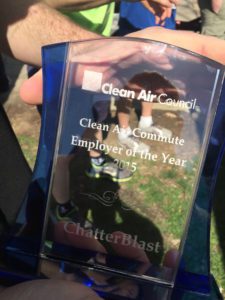
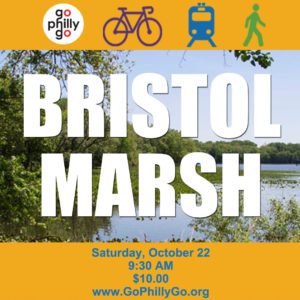
Get multimodal with GoPhillyGo on Saturday, October 22, as we combine SEPTA Regional Rail with bicycling to travel from Center City to Bristol Marsh, a GoPhillyGo featured destination, for an afternoon of bike exploration and nature walking.
We will begin the day at Suburban Station (16th St. & JFK Blvd) by taking our bikes on a reserved SEPTA Regional Rail car at 9:45 am to the Bristol Station. From there, we will bike-explore 15 miles of the Delaware and Lehigh Canal Towpath (D&L Trail). The D&L Trail, now part of the East Coast Greenway’s 3,000 mile bike-pedestrian trail from Maine to Florida, was once a major shipping route during the Industrial Revolution. This is no-drop, leisurely paced ride (10 – 12 mph).
After the ride, we’ll break for a complimentary lunch at Bristol Marsh. Lunch will be followed by a Heritage Conservancy-led nature walk through Bristol Marsh. Heritage Conservancy works as a local partner to The Nature Conservancy to promote the ecological restoration and stewardship of Bristol Marsh. Bristol Marsh is one of the few remaining freshwater tidal marshes along the Delaware River. It is home to six rare plant species native to the Delaware River Basin. After the nature walk, we will return to Center City at 2:11 pm by a reserved SEPTA Regional Rail car.
The cost of this event is $10*. The $10 covers your SEPTA fare and lunch. This event is limited to 15 participants.
Buy your tickets TODAY!
Go to registration page.
Fill in personal and payment information.
Select Other and enter $10. The $10 is an event fee, it is not a tax-deductible donation.
Under Anything else we should know, enter GoPhillyGo at Bristol Marsh.
Join the Facebook event page to stay up-to-date on the ride!
Registration deadline is Monday, October 17.
Bristol Borough-area residents, and those coming from outside of Center City are welcome to attend. To join the bike-exploration and nature walk, meet us with your bikes at the Bristol Station at 10:20 am. Please email Erika Reinhard at ereinhard@cleanair.org to let us know we should plan to meet you.
This is a self-supported ride, we highly suggest bringing a spare tube and repair kit. All riders must wear a helmet and follow the rules of the road. Please bring a lock to safely secure your bike while we are on the nature walk. We encourage riders to pay attention to the weather forecast and to dress appropriately. We also suggest wearing high visibility clothing and to bring a water bottle and snacks. Use of Indego bike share is not permitted. If you have a dietary restrictions, please contact Erika Reinhard.
*The $10 fee is not a tax-deductible donation.
For more information, please contact Erika Reinhard, Sustainable Transportation Outreach Coordinator, by calling 215-567-4004 ext. 111 or emailing ereinhard@cleanair.org.
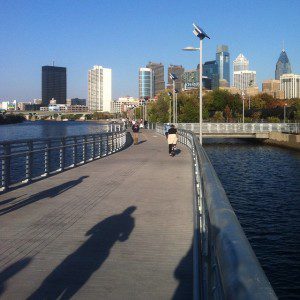
June is such a happy month for so many reasons. It marks warmer weather and sunnier days, which sets the perfect tone considering it’s also National Trails Month. There’s nothing quite like spending a beautiful summer day outdoors running, walking, or biking on any of the nation’s 60,000 miles of trails that exist throughout all 50 states. Right here in the Greater Philadelphia area, The Circuit is the main trail network. Eventually stretching 750 miles, The Circuit Trails are comprised of many existing trails (and many proposed trails coming in the future) for everyone to enjoy.
The Circuit will connect communities in and around the Philadelphia area to environmental destinations, which will provide endless recreational opportunities. However, as National Trails Month winds down, we thought commuters should know that these trails can work for their busy 9 to 5 schedule, too – by connecting people to public transportation.
The region’s public transit network is crucial for Center City to be able to provide 42% of all jobs in Philadelphia. According to Center City Reports: Getting to Work: Transit, Density & Opportunity, if all 295,000 downtown employees drove into work every day, Center City would need a parking lot spanning 2.6 miles. This is larger than William Penn’s original plan for the city, and would leave little space for the diverse array of downtown employment opportunities that exist today.
Over the last few decades, Center City has developed into the prosperous, fast paced business district that it is today, containing a whopping 295,000 jobs. With help from the city’s existing public transit network, the nearly 245,000 workers who commute in from outside Philadelphia have the option to enjoy a relaxing train ride instead of sitting in stressful bumper to bumper highway traffic.
While it’s easy for some commuters to hop on public transit out of Center City to get home after a long day, it’s not as easy for some to use public transit to get to and from work. Many train stations are geographically isolated from residential areas, making it nearly impossible for commuters to safely access them from their homes without the use of a car.
The Delaware Valley Regional Planning Commission (DVRPC) works to identify candidate SEPTA stations for bicycle friendly investments using a screening tool called RideScore, which works into SEPTA’s Cycle-Transit Plan. RideScore helps SEPTA, trail advocacy groups, and surrounding municipalities understand each station’s characteristics that influence how bike friendly it is. One way SEPTA can use this information is to prioritize bicycle rack installation at specific stations to strengthen bicycle and transit connectivity throughout the region.
Manayunk Station on the Manayunk/Norristown Line, for example, received an average RideScore of 9.3 out of 10. This is in part due to very high “Connectivity” (walkability), “Circuit Proximity,” and “Near Bicycle Facility” (on-road facilities, such as bike lanes) scores. Stations with high RideScores, like Manayunk, make it easier than ever for commuters to safely bike from home on the trail, park their bicycle, and then hop on the train to work.
Not only do trails make it easier for commuters to access public transit without the use of a car, they also offer a variety of other benefits, including:
Increased Workplace Productivity
Engaging in moderate exercise balances the brain’s neurotransmitters, which control mental activity linked to mood, attention, motivation, and the ability to retain information. Bicycling or briskly walking from home to public transit in the morning can help the brain and body cope better with stress throughout the day, which is particularly good for commuters who work in high-pressure environments.
Saved Time
According to INRIX, a leading traffic intelligence provider, the worst bottleneck in the Greater Philadelphia area is the Schuylkill Expressway eastbound at the South Street/Exit 346, where the average car speed when this area is congested is a slow 18.9 mph. By using trails in conjunction with public transit, commuters will avoid wasting time sitting in rush hour traffic.
Saved Money
It’s estimated that the average Philadelphia driver spends $2,300 in wasted time, general car maintenance, and gasoline yearly. In comparison, the average annual operating cost of a bicycle is only $308, and walking is free! Also, many employers offer RideECO, which allows employees to save money by using pre-tax dollars to pay for their commute. Using the region’s multi-use trails on foot or on bike to access public transit will save commuters more money to spend on things like happy hours and vacations.
With all of these benefits, you might want to check out existing and proposed trails in your community on The Circuit’s Trail Finder. And if you are interested in combining cycling with public transportation as part of your commute or just for discovering new places to recreate, check out GoPhillyGo.org. Hopefully by now you’ve celebrated National Trails Month, but if not – or you want to continue the celebration all summer – consider working a trail into your public transit commute!
If you have any questions, please contact Alyssa Geoghan, Sustainable Transportation Outreach Coordinator, by calling 215-567-4004 ext. 120 or emailing ageoghan@cleanair.org.

